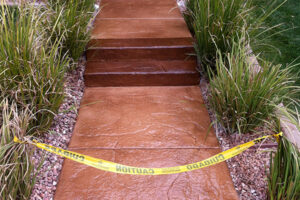100% of all decorative concrete surfaces
must be maintained with a periodic seal coat.
Weather, sun, traffic, and water will gradually deteriorate the seal coat on your decorative concrete surface. If you regularly maintain the seal coat, your surface will last for many years.
As many as 90% of all concrete coating businesses
go out of business within two years.
Many new businesses don’t last more than a handful of years. This is certainly true in the decorative coating business, because many contractors decide to offer the service without acquiring the skills and knowledge to properly execute them. As a result, these contractors end up making costly mistakes that force them out of business.
Hiring an unqualified coatings contractor can increase
the cost of maintenance by as much as 50%.
At Concrete Texturing, approximately 35% of our work involves maintaining or redoing other contractors’ work. This requires our team to evaluate the quality of work and product that was initially installed. Most of the time the product was not installed correctly, and didn’t bond with the existing concrete surface. We often need to completely grind off the applied materials, which increases the customer’s cost significantly. So make sure to do your research and select a qualified coatings contractor!
Industry Overview
The concrete coatings industry is highly fragmented, with many small companies organized as manufacturers and installers. Most have fewer than 5 employees, and many are one-man operations. Most importantly, the majority of these companies do not specialize in coatings and textured overlays.
For many, concrete resurfacing is a secondary product offering. Their primary trades are painting, concrete finishing, landscaping and/or dry-walling, but they represent themselves as professional concrete resurfacing companies.
Concrete Resurfacing material is a system, not a single product
Almost all concrete resurfacing applications consist of 2 to 5 products, combined to create a system. Consumers often have the false perception that a single product is applied and that product will look and perform the same regardless of who installs the product. This is not the case.
In a system, each product must be compatible with the other products and combined correctly. Only then will they form an attractive, durable and functional surface. If the products are not compatible, your surface will deteriorate quickly, or they may not bond to the existing surface at all.
Although most companies claim they have a revolutionary or unique product, there is little distinguishable difference among leading manufacturers’ products. And, manufacturers cannot control independent contractors and their installation techniques.
There is, however, considerable variability in craftsmanship, product knowledge, management skills and experience. Each contractor should be judged on their own skill and experience, and not the brand name of the products they use.
Imperfections enhance the finished look
Concrete overlay products offer diverse flexibility in appearance, style, texture and durability. Depending on your preferences, a skilled and experienced applicator can create a simple look, or an elaborate, one-of-a-kind mosaic. This flexibility is inherent in the product and allows a qualified contractor to create a natural, imperfect product that is visually appealing.
It’s important that customers understand upfront that there will be minor blemishes and imperfections in the surface–they constitute its one-of-a-kind beauty. It is the little flaws that give your surface character.





